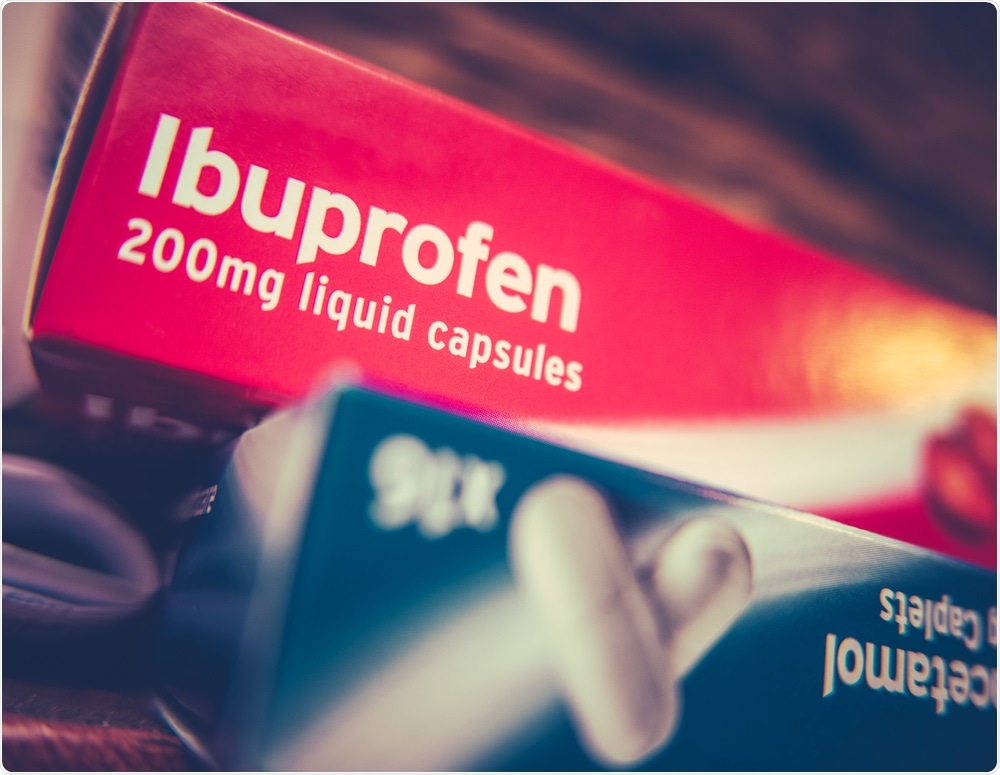The non-steroidal anti-inflammatory drug (NSAID) Ibuprofen is being tested as a potential treatment for the coronavirus disease (COVID-19). Doctors in the United Kingdom rolled out a clinical trial of the everyday painkiller to see if it reduces respiratory failure in patients experiencing severe COVID-19 disease.
A team of researchers from the pharmaceutical organization, the SEEK Group, Guy’s Hospital, King’s College London, and St. Thomas’ Hospital in London believe that the anti-inflammatory properties of the drug could help treat breathing difficulties.

Image Credit: Doomits / Shutterstock
What is ibuprofen?
Ibuprofen works by reducing hormones that cause inflammation and pain in the body. It is also used to treat fever, in some cases.
An inflammatory response happens when tissues are injured or damaged by bacteria, viruses, toxins, trauma, or other causes. The damaged cells release chemicals that include bradykinin, histamine, and prostaglandins, which cause blood vessels to leak fluid into the tissues, causing swelling.
The drug works by blocking the production of prostaglandins, which are substances that the body releases in response to infection, injury, and illness.
In March, the use of ibuprofen on COVID-19 patients was questioned. Ibuprofen and tied to severe complications, but the World Health Organization (WHO) said that there is no evidence supporting the link between the drug and the worsening of COVID-19.
When the number of cases has reached unprecedented heights, French Health Minister Oliver Veran emphasized that taking NSAIDS, like ibuprofen, could worsen the infection. He urged patients to take paracetamol instead.
However, Europe’s top Commission on Human Medicines concluded that ibuprofen was safe to take for the symptoms of coronavirus. Both paracetamol and ibuprofen can lower the temperature and ease flu-like symptoms such as body pains.
The LIBERATE trial
The trial, called LIBERATE, aims to reduce respiratory failure associated with COVID-19, which may decrease the need for more aggressive intervention, like mechanical ventilation. Also, the team wants to determine if ibuprofen can reduce the hospital stay of patients.
It will be a randomized study, recruiting up to 230 patients over the coming months. It involves an ibuprofen formulation that appeared to be more effective than standard ibuprofen in treating severe acute respiratory syndrome (ARDS), which is a complication of COVID-19.
In the trial, the researchers are using Flarin, a lipid capsule form of ibuprofen that differs from the regular tablet available in pharmacies worldwide. Flarin has a unique formulation to protect the stomach of its users, and it is available in the U.K. Some people are already taking lipid capsules for other diseases, such as arthritis.
The trial will be randomized, with half of the patients will receive standard care alone, while the other half will receive the drug additionally. The team will administer the drug at a specific stage of the disease on hospitalized patients with suspected or confirmed COVID-19 infection.
“As a new illness, there are limited treatment options for patients with Covid-19. The clinical trial will assess whether this unique formulation of an established drug benefits patients,” Richard Beale, a professor of intensive care medicine at the NHS trust, said.
In laboratory-based experiments, Flarin was shown to be more effective than standard ibuprofen for treating ARDS.
“If successful, the global public health value of this trial result would be immense given the low cost and availability of this medicine,” Matthew Hotopf, Director of NIHR Maudsley Biomedical Research Centre, said.
King’s College London’s Center for Innovative Therapeutics (C-FIT) and Beta Therapeutics and Diagnostics Health, a partnership by SEEK and King’s College, facilitate the trial.
“SEEK’s objective has always been to bring medicines to patients as quickly as possible with safety, efficacy, and affordability as key priorities using innovative and pioneering techniques. This joint venture provides SEEK with access to world-renowned research and leading experts in these therapeutic areas of unmet need. It would be wonderful to be able to save lives and improve the environment and restrictions associated with this COVID-19 pandemic,” Gregory Stoloff, CEO of SEEK Group, said.
The global pandemic has now infected more than 6.59 million people and has killed more than 388,000. The United Kingdom has more than 283,000 confirmed cases, with a death toll nearing 40,000.